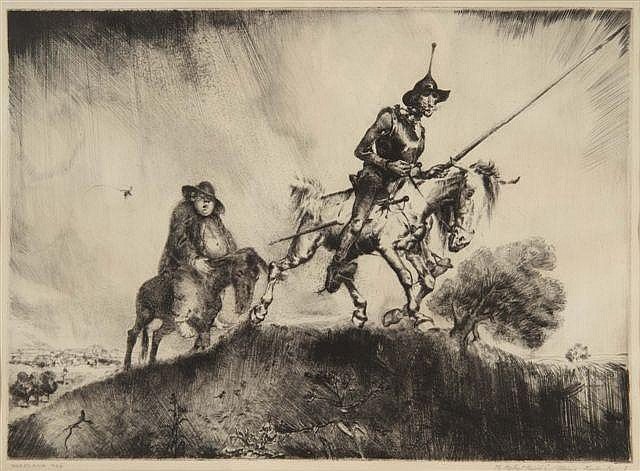MArian Kratochwil (1906-1997)
Don Quixote and Sancho Panza, 1940 🟠
Signed: “Marian Gleb Kratochwil 1940”
Ink on Paper, 518 x 372mm
Marian Kratochwil arrived in Scotland in 1940. The previous year had been an eventful one. His 1939 exhibition scheduled at the National Gallery of Art in Warsaw coincided with the invasion of Poland. He served as a 2nd lieutenant, escaped capture after the siege of Lublin and returned to his home city of Lvov, just as it fell to a joint attack by Nazi Germany and the Soviet Union.
Kratochwil managed to evade the Russian secret police and the crackdown, which resulted in many of his compatriots being massacred in the woods near Katyn in April 1940.[1]
After passing through Hungary and the Balkans, he joined the Polish Army in France. Whether he reached Britain via Dunkirk, or French North Africa is unclear, but he was in Scotland by summer 1940, working as an assistant at General Maczek’s training centre. Perhaps his experiences as a partisan, or his ability to evade capture proved useful to the Polish army reforming in Britain.
Between 1940 and 1942, Kratochwil produced a series on "War”; titles such as “Orphans” and “Mass Grave” give some indication of his harrowing experiences. Many of these drawings were shown at the Summer Exhibition of Polish Artists at the Scottish Royal Academy in 1941.
Kratochwil’s fascination with Cervantes began during his military service in 1935. Between 1936 and 1937 he produced two engravings of Don Quixote.
The following study was drawn during spare moments when he was serving with the Polish Army in Scotland.
It serves as a precursor to the many depictions of Don Quixote and Sancho Panza that he painted later in life. It also comes at a turning point in Kratochwil’s career, when he returned to painting, after seeing the front cover of a book on El Greco in the window of a Glasgow bookshop. Later interviews describe how the book “saved” his “artistic soul” and that despite “wearing a military uniform” he “felt like a painter.”
El Greco’s celestial vision and Don Quixote’s attempts to rekindle chivalry in the hills of La Mancha, were a far cry from the Europe which had spent much of Kratochwil’s life murdering political opponents and building concentration camps.
[1] Katyn Massacre - mass execution of Polish officers by the Soviet NKVD in April/May 1940



